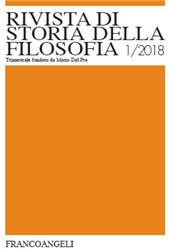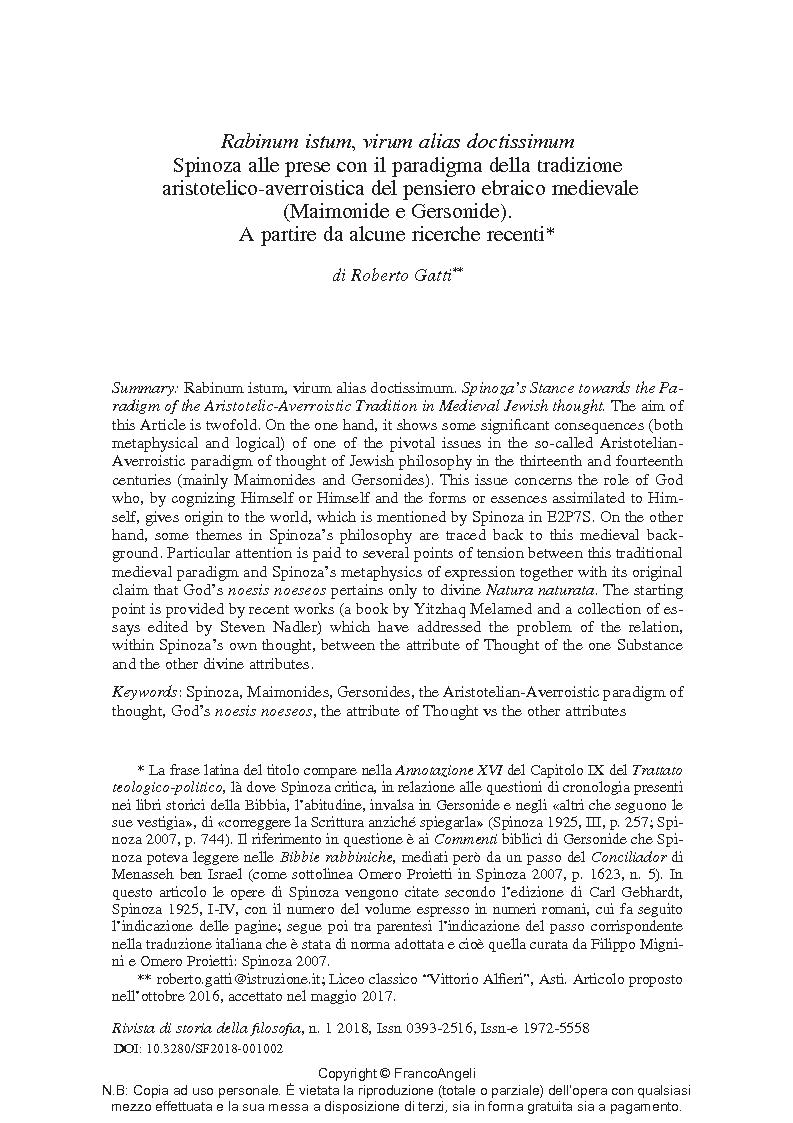2018 - Franco Angeli
Article
Digital Version
Download | Copy/paste | Printing
Rabinum istum, virum alias doctissimum Spinoza alle prese con il paradigma della tradizione aristotelico-averroistica del pensiero ebraico medievale (Maimonide e Gersonide) : a partire da alcune ricerche recenti
29-55 p.
- Rabinum istum, virum alias doctissimum. Spinoza's Stance towards the Paradigm of the Aristotelic-Averroistic Tradition in Medieval Jewish thought. The aim of this Article is twofold. On the one hand, it shows some significant consequences (both metaphysical and logical) of one of the pivotal issues in the so-called Aristotelian-Averroistic paradigm of thought of Jewish philosophy in the thirteenth and fourteenth centuries (mainly Maimonides and Gersonides). This issue concerns the role of God who, by cognizing Himself or Himself and the forms or essences assimilated to Himself, gives origin to the world, which is mentioned by Spinoza in E2P7S. On the other hand, some themes in Spinoza's philosophy are traced back to this medieval background. Particular attention is paid to several points of tension between this traditional medieval paradigm and Spinoza's metaphysics of expression together with its original claim that God's noesis noeseos pertains only to divine Natura naturata.
- The starting point is provided by recent works (a book by Yitzhaq Melamed and a collection of essays edited by Steven Nadler) which have addressed the problem of the relation, within Spinoza's own thought, between the attribute of Thought of the one Substance and the other divine attributes. [Publishers' text].
-
Information
ISSN: 1972-5558
KEYWORDS
- Spinoza, Maimonides, Gersonides, the Aristotelian-Averroistic paradigm of thought, God's noesis noeseos, the attribute of Thought vs the other attribute
-
In this issue
- Thomas Hobbes, le guerre di religione e il mito dell'Ercole gallico
- Rabinum istum, virum alias doctissimum Spinoza alle prese con il paradigma della tradizione aristotelico-averroistica del pensiero ebraico medievale (Maimonide e Gersonide) : a partire da alcune ricerche recenti
- Fra metafisica, scienze della natura e scienze della vita : percorsi della causalità nella filosofia scozzese del common sense
- Libertà e natura nelle serie fenomeniche
- Il dibattito sulla cosa in sé nell'Aetas Kantiana e la sua rilevanza per la genesi della Dottrina della Scienza di Johann Gottlieb Fichte
- L'edizione degli Scritti giovanili di Hegel curata da Edoardo Mirri
- Autoriforma della dialettica hegeliana?
- Lettere di Piero Martinetti a Uberto Pestalozza
- Note sui rapporti tra Eugenio Garin e Hans Baron
- De immortalitate animae : seminario su Pietro Pomponazzi
- Le Séminaire Hobbes de l'Association internationale des amis de Hobbes / Hobbes Scholars International Association
- Recensioni
- Schede



